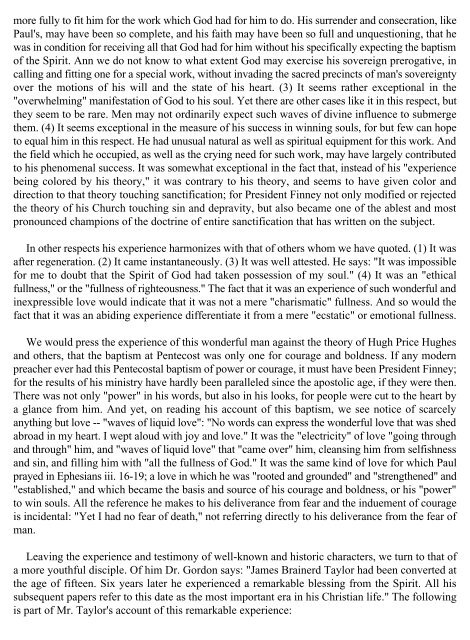Scriptural Sanctification - Media Sabda Org
Scriptural Sanctification - Media Sabda Org
Scriptural Sanctification - Media Sabda Org
Create successful ePaper yourself
Turn your PDF publications into a flip-book with our unique Google optimized e-Paper software.
more fully to fit him for the work which God had for him to do. His surrender and consecration, like<br />
Paul's, may have been so complete, and his faith may have been so full and unquestioning, that he<br />
was in condition for receiving all that God had for him without his specifically expecting the baptism<br />
of the Spirit. Ann we do not know to what extent God may exercise his sovereign prerogative, in<br />
calling and fitting one for a special work, without invading the sacred precincts of man's sovereignty<br />
over the motions of his will and the state of his heart. (3) It seems rather exceptional in the<br />
"overwhelming" manifestation of God to his soul. Yet there are other cases like it in this respect, but<br />
they seem to be rare. Men may not ordinarily expect such waves of divine influence to submerge<br />
them. (4) It seems exceptional in the measure of his success in winning souls, for but few can hope<br />
to equal him in this respect. He had unusual natural as well as spiritual equipment for this work. And<br />
the field which he occupied, as well as the crying need for such work, may have largely contributed<br />
to his phenomenal success. It was somewhat exceptional in the fact that, instead of his "experience<br />
being colored by his theory," it was contrary to his theory, and seems to have given color and<br />
direction to that theory touching sanctification; for President Finney not only modified or rejected<br />
the theory of his Church touching sin and depravity, but also became one of the ablest and most<br />
pronounced champions of the doctrine of entire sanctification that has written on the subject.<br />
In other respects his experience harmonizes with that of others whom we have quoted. (1) It was<br />
after regeneration. (2) It came instantaneously. (3) It was well attested. He says: "It was impossible<br />
for me to doubt that the Spirit of God had taken possession of my soul." (4) It was an "ethical<br />
fullness," or the "fullness of righteousness." The fact that it was an experience of such wonderful and<br />
inexpressible love would indicate that it was not a mere "charismatic" fullness. And so would the<br />
fact that it was an abiding experience differentiate it from a mere "ecstatic" or emotional fullness.<br />
We would press the experience of this wonderful man against the theory of Hugh Price Hughes<br />
and others, that the baptism at Pentecost was only one for courage and boldness. If any modern<br />
preacher ever had this Pentecostal baptism of power or courage, it must have been President Finney;<br />
for the results of his ministry have hardly been paralleled since the apostolic age, if they were then.<br />
There was not only "power" in his words, but also in his looks, for people were cut to the heart by<br />
a glance from him. And yet, on reading his account of this baptism, we see notice of scarcely<br />
anything but love -- "waves of liquid love": "No words can express the wonderful love that was shed<br />
abroad in my heart. I wept aloud with joy and love." It was the "electricity" of love "going through<br />
and through" him, and "waves of liquid love" that "came over" him, cleansing him from selfishness<br />
and sin, and filling him with "all the fullness of God." It was the same kind of love for which Paul<br />
prayed in Ephesians iii. 16-19; a love in which he was "rooted and grounded" and "strengthened" and<br />
"established," and which became the basis and source of his courage and boldness, or his "power"<br />
to win souls. All the reference he makes to his deliverance from fear and the induement of courage<br />
is incidental: "Yet I had no fear of death," not referring directly to his deliverance from the fear of<br />
man.<br />
Leaving the experience and testimony of well-known and historic characters, we turn to that of<br />
a more youthful disciple. Of him Dr. Gordon says: "James Brainerd Taylor had been converted at<br />
the age of fifteen. Six years later he experienced a remarkable blessing from the Spirit. All his<br />
subsequent papers refer to this date as the most important era in his Christian life." The following<br />
is part of Mr. Taylor's account of this remarkable experience:
















